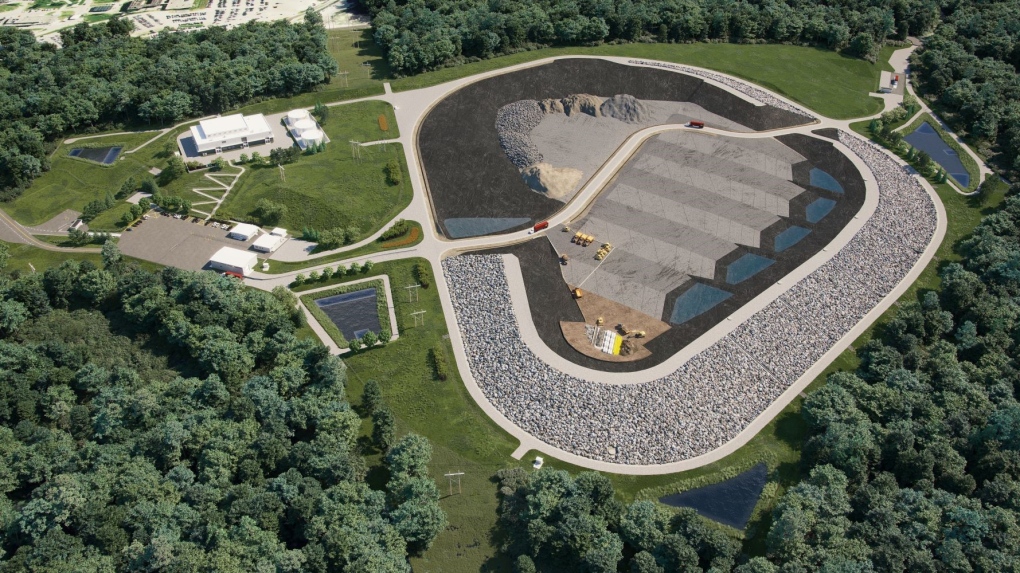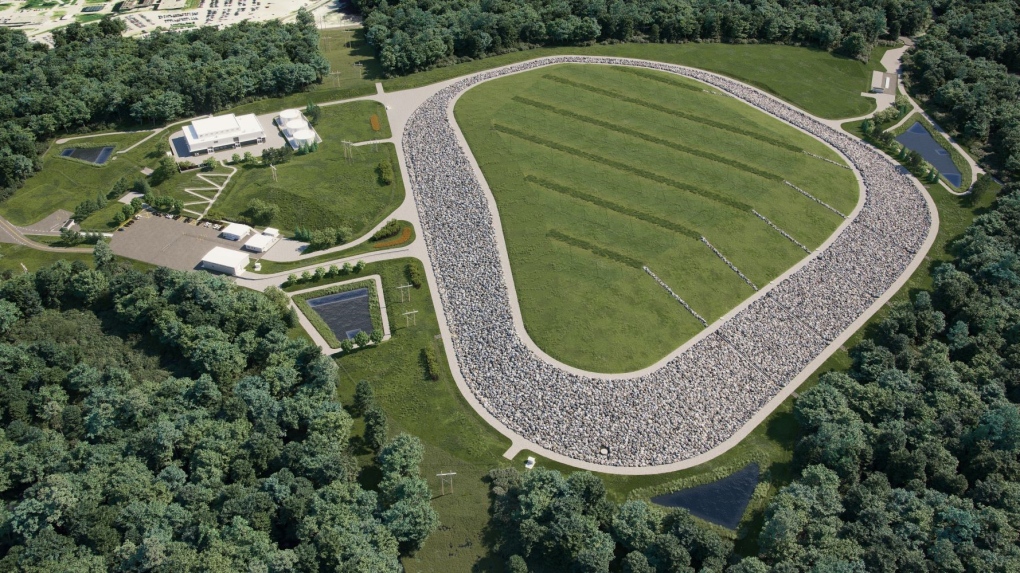Federal regulator gives go-ahead to nuclear waste disposal facility in Deep River, Ont.
The Canadian Nuclear Safety Commission (CNSC) has approved a controversial plan for a near surface disposal facility (NSDF) for nuclear waste on the Chalk River Laboratories site in Deep River, Ont.
The CNSC said it has determined that the project is not likely to cause significant adverse effects, "provided that [Canadian Nuclear Laboratories] implements all proposed mitigation and follow-up monitoring measures, including continued engagement with Indigenous Nations and communities and environmental monitoring to verify the predictions of the environmental assessment," a news release says.
- Sign up now for daily CTV News Ottawa newsletters
- The information you need to know, sent directly to you: Download the CTV News App
The project would be used to store up to one million cubic metres of solid low-level radioactive waste, such as contaminated personal protective clothing and building materials. The 16-hectare site would be built about 1.2 kilometres from the Ottawa River. The majority of the waste will come from the Chalk River Laboratories site. Approximately 10 per cent of the waste volume will come from other sites owned by Atomic Energy of Canada Limited (AECL) or from commercial sources such as Canadian hospitals and universities.
Speaking to CTV News, Deep River mayor Suzanne D'Eon said she is happy a decision has been made.
"The risk is infinitesimal and this is what people need to know and understand," D'Eon said. "We're just very happy that the CNSC has made a decision based on science and not fear mongering."
Several groups opposed to project
Community groups have voiced concerns about the project for years, saying that the landfill could pollute the river, which is a primary source of drinking water for many communities, including Ottawa.
The CNSC said it gave careful consideration to all submissions and perspectives it received throughout the multi-year regulatory review and hearing process, which began in 2016.
Several Indigenous groups called on the government this summer to abandon the project.
"The Kichi Sibi is sacred to our peoples and at the heart of our unceded homeland," said Chief Lance Haymond, of Kebaowek First Nation, in a statement in June 2023. "The Algonquin peoples never consented to the Chalk River site being used for over 75 years for nuclear reactors and research, and now being the site for a permanent radioactive waste dump. Consultation was far too late and inadequate, and we reject the plan."
Ole Hendrickson, with Concerned Citizens of Renfrew County told CTV News Ottawa in an interview the CNSC hasn't been listening to the community.
"Not a surprise but we're really disappointed CNSC isn't paying attention to the concerns, particularly of First Nations, who haven't given their consent," he said. "Certainly, we don't want to see the Ottawa River being used as a sewer for radioactive waste."
Hendrickson said he's also concerned about animal habitats being displaced
"They have to clear 35 hectares of mature, high-quality forest and displace habitats for bears, wolves, moose, endangered species, turtles; it's just the wrong place."
The CNSC said it consulted with Indigenous groups and First Nations.
"The Commission was satisfied it had fulfilled its constitutional responsibility to consult and, where appropriate, accommodate Indigenous rights in respect of its decision making on the NSDF Project," the CNSC said. "In making its [environmental assessment] decision, the Commission concluded that the NSDF Project is protective of human health and the environment, including the Ottawa River, and that the proposed site is an acceptable and safe location for the NSDF Project."
D'Eon says most people in Deep River are not concerned.
"I would say most residents in Deep River are very familiar with the work done at Chalk River," she said. "We believe it's the absolute right thing to do for the waste that 90 per cent of which is existing at the Chalk River site."
Politicians in national capital region concerned
Gatineau, Que. mayor France Bélisle said the decision to approve the landfill was disappointing.
"[It] raises critical concerns about the drinking water safety of millions of residents. We will continue to push for adequate measures to minimize risks to our citizens along the Ottawa River," she said in a post on X in French.
Ottawa city councillor Theresa Kavanagh also expressed concern about the facility.
I remain very concerned on the long-term effects of this decision given that the Ottawa River is our main supply of drinking water," she said on social media.
The federal Crown corporation Atomic Energy of Canada Limited (AECL) owns Chalk River Laboratories. As the licensee, Canadian Nuclear Laboratories (CNL) operates the site under a government-owned, contractor-operated model. The Chalk River Laboratories site includes Class I and Class II nuclear facilities, waste management areas, radioisotope laboratories, support facilities and offices.
CNL says the facility will be built with an engineered containment mound that has passive safety features. Natural and synthetic barriers are designed to work together to isolate waste materials from the environment.
"It is designed to contain and isolate it from the environment for the lifetime of the hazardous waste," said CNL Deputy Vice-President of Integrated Waste and Fuel Programs Meggan Vickerd.
 A depiction of the nuclear waste disposal site that will be located on Canadian Nuclear Laboratories property. (Canadian Nuclear Laboratories/supplied)
A depiction of the nuclear waste disposal site that will be located on Canadian Nuclear Laboratories property. (Canadian Nuclear Laboratories/supplied)
"The waste goes with it inside and then, as we fill each individual cell, we start to put the top liner on which again is an engineered liner system with multiple layers of geosynthetic liners," Vickerd added. "We also have a leachate collection systems, so any rainwater or snow that may make contact with the waste and create leachate, we will collect that and treat that."
 A depiction of the nuclear waste disposal site that will be located on Canadian Nuclear Laboratories property. The disposed waste will be covered with a grassy mound to isolate it from the environment. (Canadian Nuclear Laboratories/supplied)
A depiction of the nuclear waste disposal site that will be located on Canadian Nuclear Laboratories property. The disposed waste will be covered with a grassy mound to isolate it from the environment. (Canadian Nuclear Laboratories/supplied)
With files from CTV News Ottawa's Peter Szperling and Dylan Dyson.
CTVNews.ca Top Stories

Teenage phenom Gavin McKenna scores, Canada tops Finland 4-0 in world junior opener
Teenage sensation Gavin McKenna scored late in the first period and Carter George made 31 saves for the shutout as Canada picked up a 4-0 victory over Finland in the host country's opener at the world junior hockey championship Thursday.
Ministers Joly, LeBlanc travel to Florida to meet with Trump's team
Two members of Prime Minister Justin Trudeau's cabinet will be in Palm Beach, Fla., Friday to meet with members of Donald Trump's team.
Hwy. 401 off-ramp shut down due to Boxing Day deal-hunters now reopen
A Highway 401 off-ramp west of Toronto that became so clogged up with Boxing Day deal-hunters Thursday that police had to shut it down out of safety concerns has re-opened.
India alleges widespread trafficking of international students through Canada to U.S.
Indian law enforcement agencies say they are investigating alleged links between dozens of colleges in Canada and two 'entities' in Mumbai accused of illegally ferrying students across the Canada-United States border.
Teen actor Hudson Meek, who appeared in 'Baby Driver,' dies after falling from moving vehicle
Hudson Meek, the 16-year-old actor who appeared in 'Baby Driver,' died last week after falling from a moving vehicle in Vestavia Hills, Alabama, according to CNN affiliate WVTM.
B.C woman awarded nearly $750K in court case against contractor
A B.C. woman has been awarded nearly $750,000 in damages in a dispute with a contractor who strung her along for a year and a half and failed to complete a renovation, according to a recent court decision.
Florida pizza deliverer charged with stabbing pregnant woman after tip dispute
A pizza deliverer in central Florida has been charged with pushing her way into a motel room with an accomplice and stabbing a pregnant woman after a dispute over a tip, authorities said.
2 minors, 2 adults critically injured in south Calgary crash; incident was preceded by a robbery
Multiple people were rushed to hospital, including two minors, in the aftermath of a serious vehicle collision on Thursday morning.
Christmas Eve stowaway caught on Delta airplane at Seattle airport
A stowaway was caught trying to nab a ride on a Delta Air Lines plane at Seattle-Tacoma International Airport on Christmas Eve.































